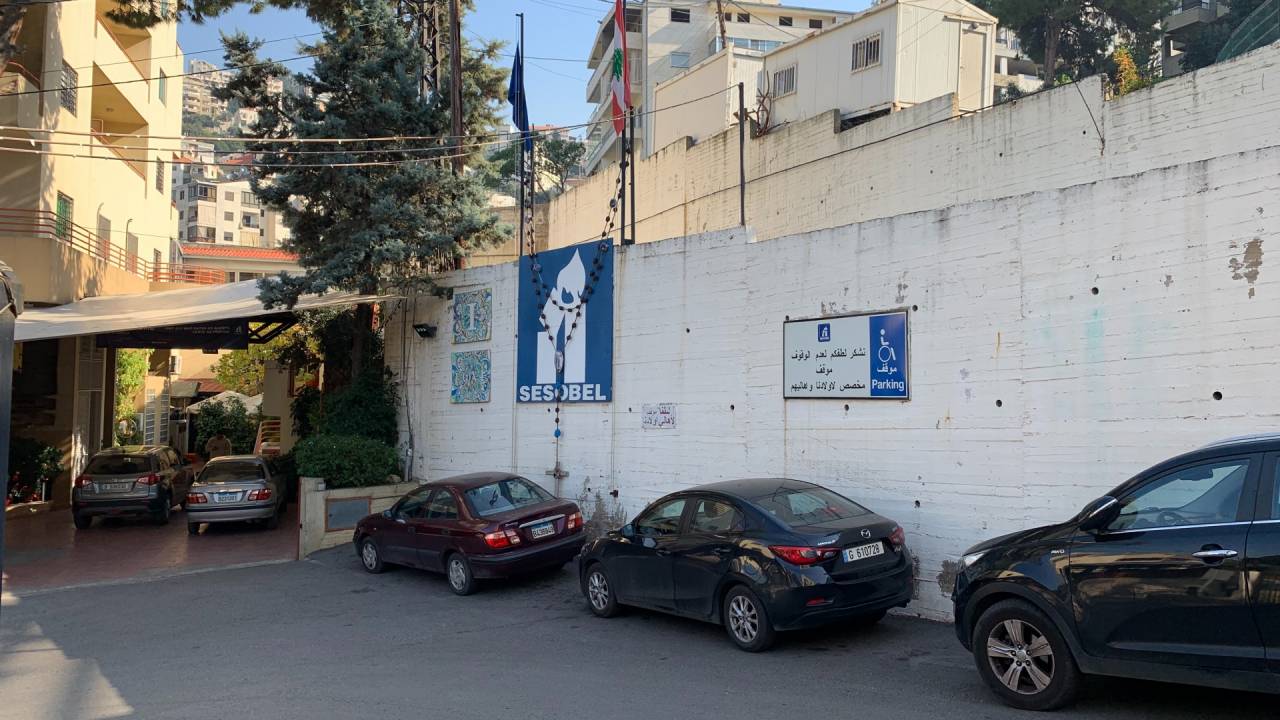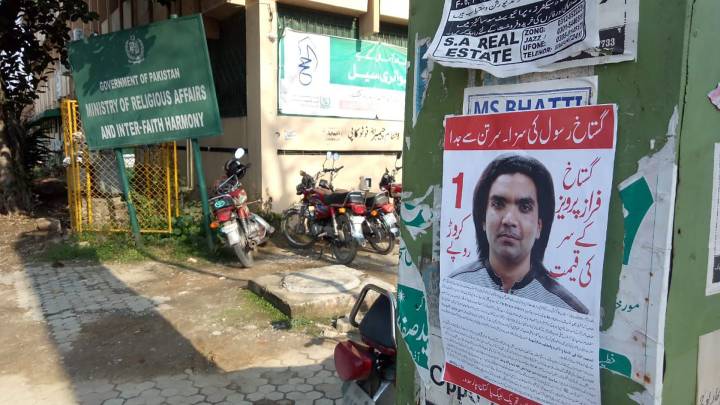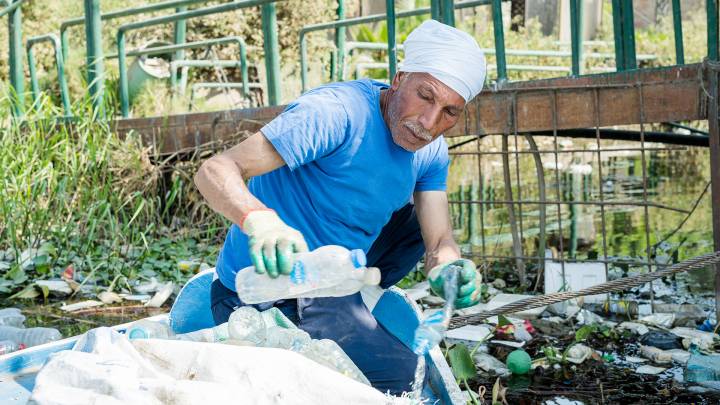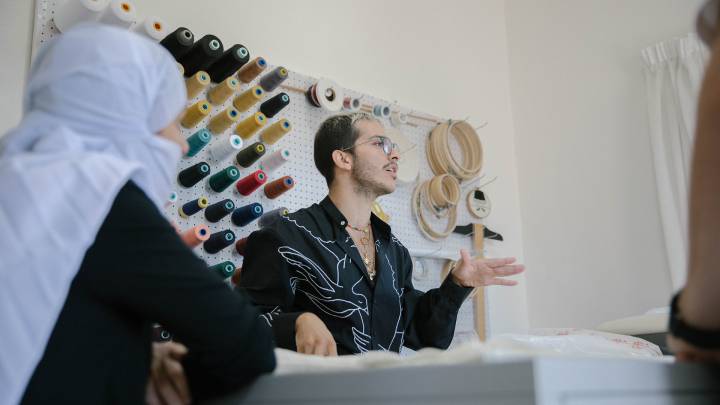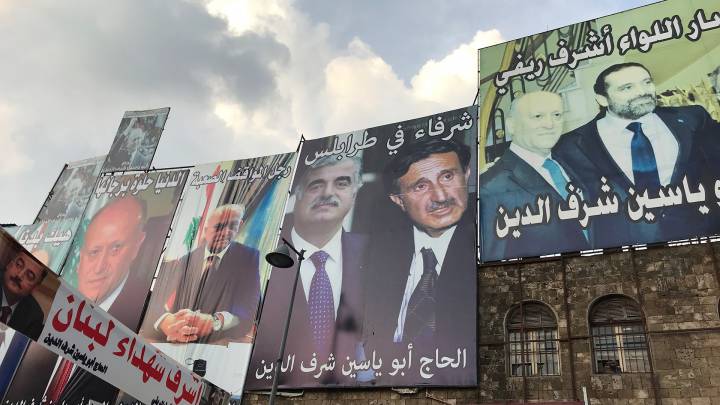Lebanon’s social welfare institutions face the unknown, as the country grapples with financial and economic crises.
Some children grow up faster than others and become old beyond their years. They open their eyes to harsh realities, and shut them to big dreams rendered almost impossible in the dire conditions of their countries. These dreams, however, keep them hopeful for better things to come and help them cope with their bitter experiences.
She greets everyone with a beautiful smile. Her eyes flicker around the room, examining its corners. She crosses the corridors to finally reach the physiotherapy room. She tries to prop her frail body up in her wheelchair. Her innocent smile never leaves her face.
She stretches her hands out to meet those of her physiotherapist. Despite her pain, her blue eyes still shine with hope. She looks around at the people in the room. She smiles again. No room for despair. The therapist gently helps her to sit on the floor. She whispers: “Don’t be afraid. Stop me if you feel anything.” The young woman nods and smiles again.
Gabrielle faces her pains with a smile, her only weapon at her young age. The 14-year-old suffers from partial paralysis in all four limbs, as a result of her preterm birth. Her mother, Jacqueline Khoury, was pregnant with twins when she learned that her 22-year-old daughter had died in a car accident in Lebanon. The terrible news wreaked havoc on her psyche, causing her to have an early delivery at six months of pregnancy. Gabrielle’s twin sister died instantly at birth, and a lack of oxygen to the brain left Gabrielle a quadriplegic.
Khoury was devastated by the death of her two daughters. The pain was too much to bear. And it did not end there. When Gabrielle turned one, her mother received another painful blow when she learned of her beloved toddler’s partial paralysis.
But Khoury’s little one was her only hope of recovering and remaining strong, so that she could be there for her, and guide her on the arduous journey of treatment and possible recovery.
“We started the treatment when Gabrielle was only one year old, because her case was delicate and difficult. We were lucky to get in touch with a doctor who works at SESOBEL, an organisation that provides social services for children with disabilities. The doctor recommended that I take Gabrielle there,” Khoury says.
“Our lives changed when we went to the organisation. SESOBEL did not only provide care for Gabrielle, it embraced the whole family, especially me.”
In 2019, SESOBEL threatened to shut down
This silver lining is disappearing, as many organisations in Lebanon, including SESOBEL, are threatened by closure, given the dire economic situation gripping the country. Things took yet another turn for the worse in the aftermath of the deadly blast at Beirut’s port that killed over 250 people and destroyed thousands of houses and businesses, dragging the country back into a deeper pit, and shifting priorities.
At SESOBEL, Gabrielle made many new friends. The organisation became her second family and home. Julia, an eight-year-old with thick dark hair, is one of them. She hides her face and smiles shyly. Julia walks steadily across the room, but suddenly comes to a halt. Then she tries to walk again, facing her pain. She insists on taking another step forward despite the severe ligament laxity all over her body, due to an injury she sustained last year.
According to Julia’s mother, Sabine Chaib, SESOBEL has been a great help. “We changed so many physiotherapists, as Julia was not improving. I always felt that there must be something more that we could do to help her, until we found out about SESOBEL, which became our second home,” she says.
Chaib shares Khoury’s concerns about SESOBEL closing its doors because of the general financial situation and the delay of the Lebanese government in paying its dues, not to mention the decline in donations and aid.
In 2019, SESOBEL threatened to shut down and stop receiving and caring for children due to its ongoing budget deficit, prompting parents to stage a sit-in in front of the Maronite Patriarchate in Bkerke and the Ministry of Social Affairs, demanding that the rights of their children be upheld.
At the time, SESOBEL obtained promises of improvements. Yet the organisation still had to tighten its belt and take harsh measures, including cancelling daily meals and summer activities, and limiting children’s attendance to three days a week instead of five. Working hours and salaries of employees were also reduced.
The pertinent question, however, is: Today, nearly a year later, has the situation improved?
Historically, social welfare institutions have been established in Lebanon in partnership with the Lebanese state, to offer welfare services to people with special needs. According to custom, these institutions provide the necessary infrastructure, while the state contributes to financing their work based on an annual study of the cost of providing children with social welfare services. Partnership contracts are signed between the Lebanese state, represented by the Ministry of Social Affairs, and social welfare institutions. The contracts are renewable every January.
Establishing a welfare institution or a charitable association in Lebanon is not a complicated matter. The organisations have to have clear objectives and must apply for a declaration notice from the Ministry of Interior, for their activities to be licensed.
Thus, there are now 11,000 of these institutions, with 103 of them concerned with welfare services for people with special needs. SESOBEL, established in 1976, is one of the oldest and most prominent.
In the 2019 state budget, the government allocated 170 billion Lebanese pounds [$113 million, at the official exchange rate of 1,500 pounds to the dollar] to support social welfare organisations. This is divided among them according to size and number of beneficiaries (such as children). The government allocation comes to at most 30% of an organisation’s budget, reflecting the Lebanese state’s poor approach to this sector and its low level of contribution to it.
As the result of the economic situation, organisations have been struggling to secure funds
As the result of the difficult economic conditions that have gripped the country for nearly five years, compounded by the collapse of the Lebanese pound against the US dollar and the Beirut blast, these organisations have been struggling to secure funds. While allocations have been approved on paper, it is difficult for the Ministry of Finance to disburse them, given the country’s budget deficit and other urgent and pressing needs.
This left these organisations with a massive deficit in 2019, according to SESOBEL President Fadia Safi. “The situation is very dire, especially since the Lebanese state does not pay the required attention to this sector. Today, we are getting government contributions according to the 2011 cost price, which no longer reflects the high cost of living the Lebanese are currently facing,” she says.
“In 2012, it was approved to increase the state contribution to the sector by 25%, which has yet to be implemented. Today, this increase won’t make much difference given the new index of the cost of living in light of the acute economic crisis. But we thought it would be better than nothing until the government figures out a solution to its budget deficit.”
Safi explains that the situation has worsened, with declining aid and donations. “Since 2019, we have felt that the bulk of the donations and aid has gone to the support and relief of refugees and displaced persons. This is in addition to capital controls on Lebanese depositors in banks, which led to further decline in donations.”
Safi explains that it is the children that matter most. “We can’t keep them at home for a longer time. They are missing their classes, medical and therapeutic activities, which will negatively affect their behavioural and psychological situation and will affect their families too. We sensed this greatly during the coronavirus crisis and lockdown, and later with the Beirut explosion. Children are psychologically vulnerable and do not feel secure about the future.”
These same concerns are raised by Ismail al-Zayn, Director of the Al-Hadi Institute for the Deaf, the Blind and People with Learning Disabilities, who is also facing major challenges due to the financial deficit and the non-disbursement of funds.
“To this day, 65 billion Lebanese pounds [$43.3 million] from the fourth quarter of 2019 have yet to be paid to the organisations. To add insult to injury, we still haven’t renewed our contracts with the Lebanese state for 2020. We are trying to provide care services to children and possible treatments remotely during these coronavirus times, without any actual contract with the state. This issue has been on hold after the Beirut explosion,” Zayn says.
“This does not bode well. Closing this sector would be tantamount to a crime against children. It is worth mentioning that the sector includes 150,000 beneficiaries and 12,000 workers, including employees, trainers, specialists and therapists.”
Restoring rights has never been an effortless undertaking in Lebanon. The Lebanese have to struggle to assert their rights through constant pressure on decision-makers. In this context, social welfare institutions have been intensifying their meetings within the National Council of Disability Affairs, which includes different institutions providing care for people with special needs, in order to agree on the next steps to pressure Lebanese officials to stop stalling and pay their accumulated dues, and to present a new cost price study that reflects the deteriorating economic reality of 2020.
Up to 20 billion Lebanese pounds go to inactive associations
“It is likely that organisations and institutions will declare a strike, to raise their voice against the unfair disregard of the rights of this group of Lebanese, and to make our voice heard to the officials. We are trying by every means not to go in the direction in which they are pushing us, which is to close down institutions helping people with disabilities,” Zayn says.
The difficult situation prompts a question about the existence of ‘fictitious’ associations, those benefiting from government funding without providing any services to society in return.
In this context, Mohammed Shams al-Din of Beirut-based Information International, a research company, explains that the term ‘fictitious’ is not exactly accurate. There are shell institutions that exist on paper and have already obtained a declaration notice from the ministry, but are not active.
“They renew their contracts with the Ministry of Social Affairs and get the necessary funding without carrying out any real activity in the service of the public interest,” he says. “There is for instance an association for the elderly that signed a contract with the ministry to provide care for 30 elderly people whose names are registered in its record. They get the money, but they don’t provide any social welfare services whatsoever.”
“Official institutions are often aware of such shell associations, but don’t lift a finger to end their contracts because of political or sectarian cover. If the Lebanese state has been disbursing some 170 billion Lebanese pounds to support the social welfare associations, 18 to 20 billion pounds of it go to inactive associations, about 300 of them.”
For his part, former Lebanese Minister of Social Affairs Richard Kouyoumjian denies these claims. “There are 103 well-known associations with clear activities and objectives, most of which have become prominent institutions with a long history of social work,” he says.
Kouyoumjian has witnessed the hardships of these institutions. During his time in office, many were threatened with closure due to the delay of the Lebanese state in paying its dues. At the time, he tried to increase his ministry’s budget allocation by 40 billion pounds ($26.4 million) to increase support for social welfare organisations.
He suggested subtracting this amount from the Public Housing Institute, which supports housing loans for low-income people. This raised the ire of the public.
“The Lebanese state has to work according to overriding priorities. It has to provide support to the sectors most in need, even if this comes at the expense of other sectors that are not a top priority at the moment,” he says. “Closing down social welfare institutions in Lebanon would be tantamount to a major humanitarian crime. The government should not allow that.”
Kouyoumjian stresses the important role of the private sector, represented by social welfare institutions, an opinion that Shams al-Din does not agree with. “The Lebanese state should have its own institutions, funded directly by the government. Civil society should also have its own institutions, funded by civil society and not by the state.”
Kouyoumjian concludes: “The primary source of funding for social welfare institutions in Lebanon comes from the Lebanese state, which constitutes 80% of their budget, and not 30% as claimed by many. Further proof of that is the fact that these institutions accumulate major deficits when the government is late in providing them with financial support.”
There are different opinions on this issue, but one thing remains true: Gabrielle and her friends have the right to full care. They have the right to feel safe and embraced. It should be evident and normal for them to feel equal, as cared for by their state as the rest of their fellow Lebanese.
The research for this article was supported by the Candid Foundation’s journalism grant.

